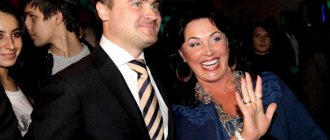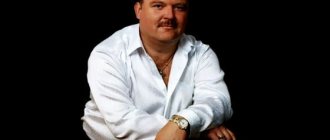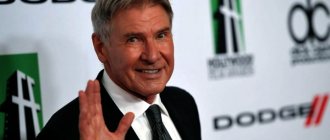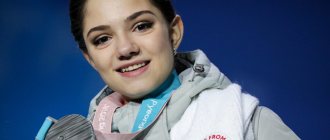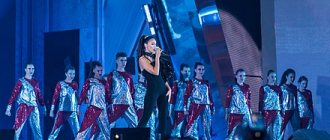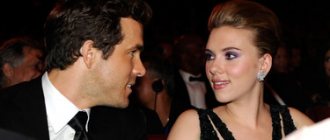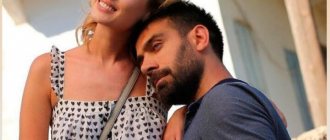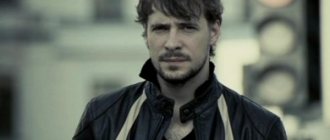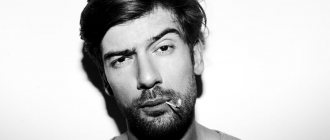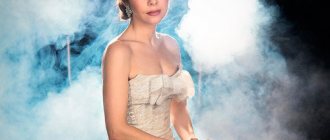The Air Jordan that took the world by storm. Biography of the great basketball player
May 14, 2020
Michael Jordan is a six-time NBA champion with the Chicago Bulls. Photo: wallpaperflare.com
Michael Jordan could have become a baseball player, but he chose basketball. With him, the Chicago Bulls won the first NBA title, and immediately after - the second and third titles. Two years after his first retirement, Jordan returned to Chicago to help a team that had lost its leadership. Michael won three more championships with the Chicago Bulls and finally left the club.
Jordan is the recipient of numerous individual awards. The main one is the title of “NBA Most Valuable Player,” which he was awarded five times. Only former Milwaukee Bucks and Los Angeles Lakers player Kareem Abdul-Jabbar has been given this title more than Michael.
Jordan's athletic qualities were assessed not only with trophies, but also with prizes and advertising contracts, many of which are still in effect today. In 2020, Forbes named Jordan the highest-paid athlete in history.
There were many obstacles in Jordan's path. In his youth, Michael was short and did not make the school basketball teams. On several occasions, Michael's rise could have been cut short by tragedy: as a child, he nearly drowned twice. At the peak of his form, Jordan lost his father and retired from basketball.
Michael Jordan's life is a story of overcoming followed by success. We talk about the path to fame of one of the best basketball players in history.
Michael was born into a large family
Michael's parents are James and Deloris Jordan. Michael was the fourth of five Jordan children.
Before Michael was born, James served in the United States Armed Forces. Deloris took cosmetology courses, but after the birth of her first child, she interrupted her studies and moved to James's parents' house in Teachey, Duplin County, North Carolina. James was assigned to a military base in Virginia, which was an hour's drive from Teachey. This allowed him to visit his family frequently during his service.
The Jordans were the first to have a son, James Ronald. Then a daughter, Deloris, and a son, Larry, appeared in the family. After the birth of his third child, James retired from the Air Force. Due to the GI Bill, which provided preferential vocational training for veterans, he moved to Brooklyn, New York. There James learned to assemble and maintain hydraulic equipment.
A fourth child, Michael, was born into the Jordan family in Brooklyn. This happened on Sunday, February 17, 1963.
The Jordans left New York when Michael was five months old. The family returned to North Carolina. First they moved back to Teachey, then to the larger Wallace, where the Jordans had their last, fifth child. James worked at a General Electric plant, and Deloris worked at a bank. In 1970, the family moved again - to Wilmington. Michael spent his school years there.
As a child, Michael was lazy and got into trouble. One day he almost cut off his finger for a bet.
Michael was not an obedient child. His father said:
“If Michael was told that the stove was hot and should not be touched, he would touch it. If he was told that the painted wall was not yet dry, he would touch the wall to make sure that the paint was not dry.”
Jordan always took on challenges and often got into trouble because of it. For example, at the age of four, Michael had an argument with his cousin. He offered Jordan a bet: he would pay a dollar if Michael cut off his toe. Jordan didn't want to seem like a coward and lowered the ax to his toe. The finger remained in place, but it was not possible to avoid the wound.
During his school years, another problem of Michael was discovered - he was not a hardworking child. Jordan didn't want to work and shirked his household responsibilities. One summer, Deloris got her son a job at a hotel. He had to do room service. The experience was negative. Michael was constantly late and decided never to look for work again.
Discipline problems led Jordan to temporary expulsion from school. Michael left the school grounds without asking and ran to the store to buy candy. For this he was suspended from classes for several days.
Michael became more responsible in high school. He improved his discipline and academic performance, and after school he took a correspondence course in economics.
Jordan poses for a school album, 1981. Photo: chicago.suntimes.com
Jordan often came close to death
At the age of two, Michael almost died from an electric shock. He touched the junction of two extension cords lying on the wet grass. The blow was strong - the child was thrown a couple of meters.
At seven or eight years old, Michael almost drowned. Together with a friend, they swam in the ocean. When the children were far from the shore, a breaker wave appeared. The friend was covered by a wave and pulled to the bottom. At the last moment he almost pulled Michael down with him. Jordan's friend died. Since then, Michael has been afraid of water. Later, Michael could again become a victim of water. At age 11, he nearly drowned while trying to pass a school-mandated swimming test. Jordan couldn't swim, but he went into the water anyway and tried to swim.
Already a famous basketball player, Michael explained why he sometimes made rash and risky actions: “I never thought about the fact that I could make a bad shot. Why? Because when you think about the possibility of failure, you set yourself up for failure. If I'm going to jump into the pool, even though I know I can't swim, I think about how I can swim."
Was Jordan wrong for accusing Grant of leaking?
Horace Grant is The Last Dance's most vocal critic. After the release of the tenth episode, he called the whole story "lies, lies, lies" and challenged Jordan to a fist fight to find out which of them was actually the "snitch". In the series, Jordan noted that it was Horace Grant who leaked information about the team to Sam Smith for "The Jordan Rules." Horace Grant (not very correctly) replied that he himself set up his former partners in the “cocaine circus.”
If you open Jordan's Rules, the sources become more or less clear by the middle.
Jackson's former assistant Joni Buck. (Krause kicked him out the door exactly for this in ’94).
Apparently, Phil Jackson himself, who loved to use the media to motivate the team.
Several reservists.
And Horace Grant.
"The Jordan Rules" talks about Jordan's special situation and how it annoys Grant. The fact that the forward has the status of a “scapegoat” in the club, but he is trying to fight the attacks of the superstar and Phil Jackson. About how they force him to put on glasses and motivate him to play harder basketball. About how he is constantly oppressed for being soft and whining. About how his former friend Scottie Pippen fell under Jordan's spell...
This is so obvious that when Horace Grant came to Moscow, we asked him not “Did you tell Sam Smith about everything?”, but “You told Sam Smith how Jordan annoys you. What’s special about it?”
In the film, this same version is supported by Will Perdue (“Horace was always outraged by Jordan”), and indirectly by Sam Smith himself, who with a sly smile stated that he had talked to “everyone,” including Jordan himself.
In general, Grant can only be right if he himself believes that he did not leak information about the team, but simply expressed his point of view about this arrogant, selfish dude who bullied him with his nagging. His influence on the central message of The Jordan Rules, the book that destroyed Jordan's reputation as a flawless superstar, is undeniable. And after 20 years, he can no longer hide his irritation.
Jordan played baseball in elementary school. He came to basketball for his brother
Michael's father loved baseball and wanted to introduce children to his favorite sport. As soon as the children were old enough to hold a bat, he began taking them out into the yard and throwing a baseball. At the age of five or six, the boys from the Jordan family played in a children's baseball league. Michael looked good on the baseball field, and his coaches predicted a professional career for him.
From the age of nine, Jordan became interested in basketball. Michael was influenced by his older brother Larry. My father hung a basketball hoop in the yard for my brother. Michael and Larry played one on one.
In high school, Michael finally switched from baseball to basketball. Michael's baseball career began to decline at that time. In Little League Baseball, Jordan was a star and won awards. But at the age of 13, he moved to a league where athletes aged 13 to 15 competed. Michael began to lose in the competition - the coach trusted older and more experienced players.
During this time, Jordan began to spend more time on the basketball court. Michael realized that basketball was the sport he wanted to play.
Michael Jordan's early years, childhood and family
Michael Jeffrey Jordan was born in Brooklyn, New York on February 17, 1963. His parents were ordinary Americans and were never athletic or tall. Therefore, it was quite difficult for our today’s hero to count on bright successes in basketball.
Michael Jordan - as a child
At an early age, Michael always loved sports, but for a long time his number one game remained baseball. Jordan dreamed of becoming a famous pitcher, and therefore spent a lot of time with the ball and baseball glove. It is quite remarkable that such diligence quickly bore fruit. Playing in a children's team, Michael Jordan managed to become one of the best pitchers in his age category by the age of twelve. While playing baseball, the future NBA player managed to become a state champion, as well as the best player in the championship in the minor league. They predicted a great future for him in this sport. However, the young boy always did not take such words very seriously.
Perhaps that is why, already in high school, he suddenly decided to exchange baseball for basketball. One of the reasons for this decision was his older brother Larry, who as a teenager became a real star of the school basketball team. Looking at him, Michael dreamed of the same success. But all aspirations were dashed for a long time due to the indifference of school coaches.
Noting the playing qualities of the young guy, the mentors of the school team still did not dare to take him to the team because of his small stature, as well as not the most athletic physique. This attitude towards himself really hurt the young guy, and therefore, already in classes in the younger group, he always gave his best two hundred percent.
Thanks to such diligence, in the eleventh grade Michael managed not only to develop his muscles decently, but also even to gain quite a bit of height. It was during this period that the player was finally accepted into the school basketball team. From the first games, the basketball player took the position of a power forward and, successfully fitting into the team game, began to score an average of 20.8 points per match. During this period, scouts from many prestigious American universities paid attention to him. Michael always did poorly at school, however, despite this, after finishing the eleventh grade he received offers from several leading US universities.
The most persistent in its desire to acquire a bright young player was the University of North Carolina, which very soon became the home of Michael Jordan.
Jordan was not accepted into the school basketball team due to his short height.
There were no tall people in the Jordan family. Michael was no exception. Short stature greatly hindered Jordan. When Michael was 15 years old, he was rejected from his high school basketball team due to his height.
At the age of 15, Michael Jordan was only 175 cm tall. He was the tallest in the family, but this was not enough for a basketball player. Michael spent all his time on the basketball court and grew 11 cm over the summer.
In the eleventh grade, the grown-up Michael was nevertheless accepted into the basketball team. There he was noticed by an assistant coach for the University of North Carolina Tar Heels. The specialist immediately appreciated the talent of the young player.
Assistant coach Roy Williams recalled: "We decided that even if we could only afford one basketball player, it would be Michael."
While playing at the university, Michael grew even more. When Jordan played in the NBA, his height was 198 cm.
Michael Jordan: biography
Michael was born on the frosty morning of February 17, 1963 in Brooklyn. The boy grew up in a large family consisting of two adults and four children:
- Parents James Jordan and Deloris Peoples.
- Brothers James and Larry.
- Sisters Deloris and Roslyn.
The mother and father of the future basketball star did not have a special build. His brothers and sisters did not inherit tall height, which cannot be said about Michael. Michael Jordan, whose height was already 175 cm at the age of 15, now boasts 198 cm.
At first, Jordan was not interested in throwing a ball into a basket, but in a completely different sport - baseball. The boy played for the school team and achieved impressive results. Together with the guys, he won the junior league championship and became the team's most valuable player. After the teenager's height began to increase rapidly, Michael began to think about basketball.
The father contributed in every possible way to the development of his son’s talent and, having moved to North Carolina, built a basketball court in the yard. The brothers spent their days playing basketball, practicing jumping and throwing the ball accurately. Michael did better than anyone else, which they couldn’t help but notice at the high school where he was accepted into the team.
Jordan Michael played with great dedication for his school club. His average score per game reached 28 points. The young basketball player took the number “23” on his jersey, explaining his choice by imitating his older brother. The thing is that Larry played under the number “45” and Michael dreamed of at least “half” repeating his brother’s success.
In the summer of 1980, his persistence in sports was noticed at the University of North Carolina. They liked the athletic young man, and the guy was invited to become a university student. The Jordan family did not hesitate for a long time and sent their son to study. That's when Airy Michael's stellar career began.
Jordan scored 12 points in his first game with the Tar Heels.
In Jordan's first game with the University of North Carolina Tar Heels, his team beat Kansas 74-67. Michael brought the “heels” 12 points. Not only was the first match successful, but the whole season was successful. The Tar Heels reached the finals, in which they beat Georgetown (63:62). The victory in this match and the championship title for the Tar Heels was brought by Michael's throw 15 seconds before the end of the match.
Michael Jordan with the Tar Heels. Photo: pinterest.ru
Michael was distinguished from other basketball players by his self-criticism and willingness to work on mistakes. For example, after his first game with the Tar Heels, despite a number of successful throws, Jordan noted that he needed to improve on defense. Michael worked hard on his shooting and ball handling throughout the season and did not stop training during the summer break between courses. Jordan's work ethic helped him develop his talents and inspire confidence among his coaches.
Jordan wore number 12 because of a stolen jersey
Valentine's Day 1990 was memorable because Jordan performed under an unusual number. Before the match with Orlando, a jersey with number 23 was stolen right from the Chicago locker room. Michael tried to get out of the situation by trying on a fan’s jersey, but it turned out to be too small for him. The team administrator had to give His Air a spare jersey that the team had in case of emergencies.
“This has never happened to me before. It annoyed me because I'm used to certain things, and this incident was inappropriate,” Jordan said after the 49-point game against Orlando. Out of anger, probably.
Jordan won the Pan American Games, and a year later took Olympic gold
In 1983, Michael competed at the Pan American Games. He joined the US national basketball team. The team won all eight matches and won the gold medal. Jordan was the team's most productive player.
Victory at the Pan American Games allowed the team to qualify for the 1984 Olympics. Those Games were home for the United States, they were held in Los Angeles. American basketball players played well in all matches - they won 10 victories and took Olympic gold. Jordan again became the team's leading player in scoring, averaging 17.1 points per game.
Debut in a professional team
In the 1981-1982 season, Jordan was named Outstanding Rookie of the Year and led his team to the championship game. After such a successful season, Jordan was invited to be part of the NCCA All-American roster. The team that competed at the Pan American Games was more trained in attack, so when they were able to maintain a successful defense for eight games, they surprised not only the spectators, but also the jury.
In 1983, Michael was named the most efficient player, contributing 17.3 points to the US personnel. Having successfully represented itself at the Pan American Games, the team received the opportunity to participate in the 1984 Olympic Games, which were held in Los Angeles. Team USA won ten games, and Jordan received the title of most efficient player for the second time, earning 17.1 points per game. In 1984, Michael was selected in the NBA draft for the Chicago Bulls team; participants who later became part of the Basketball Hall of Fame put forward their candidacies at this draft, which made it possible to call this collection the most successful recruitment for the NBA.
In 1984, Michael began playing for the Chicago Bulls and signed a contract with Nike
Michael had to leave the Tar Heels even before winning the Olympics. Two months before the start of the Games, he entered the 1984 draft and was selected third overall by the Chicago Bulls.
Michael recalled: “It was hard to leave North Carolina. The best three years of my life passed here. It’s time to move to a new level, to move towards new achievements.”
At the time of Michael’s transfer, the Chicago Bulls were a young team without championship ambitions - the club was struggling to maintain a residence permit in the major league. The previous season, the Bulls won just 27 of 82 matches.
Jordan during his first press conference after joining the Chicago Bulls. Photo: history.bulls.com
Michael quickly became a star for the Chicago Bulls. In his first season in the NBA, Michael averaged 28.2 points per game in the regular season and 29.2 in the playoffs. These were the best results in the team. In 1985, Michael received the NBA Rookie of the Year title.
What made Jordan stand out from the crowd of other basketball players was his soaring jumps. He seemed to hover in the air for several seconds. Because of this, he received the nickname "Air Jordan" or "His Airness".
Michael's nickname was quickly monetized. In 1984, Jordan signed an advertising contract with Nike. Red and black sneakers were developed especially for him, which, at the suggestion of Jordan's agent David Falk, were called Air Jordan.
At that time, the NBA had strict requirements for the equipment of athletes. For example, the dominant color in sneakers should be black or white. The Jordans were too red. The NBA fined Michael $5,000 for each time he wore brightly colored sneakers to a game, but Nike consistently paid the fines, offsetting the costs with increased sales.
Michael with the first Air Jordans. Photo: twitter.com
Jordan put the opportunity to play above relationships with the club management
During his second season with the Chicago Bulls, Jordan suffered a left foot injury. Bulls President Jerry Reinsdorf and Vice President Jerry Krause did not want to rush Michael's recovery and return him to the court quickly.
Jordan did not agree with management's decision. He believed that he had recovered and was eager to play. When he was left out of the roster, Jordan went to his former university team and began training with it.
Michael believed that management did not care about his health, but about their investments. Jordan didn't mince words. In an interview, Michael said that he felt like “just meat” for the team management and noted his independence.
“He [Vice President Jerry Krause] thought he could control me completely because I was too valuable to him. But he couldn’t do it, because I have value only for myself. I was independent."
Without Jordan, the Chicago Bulls performed poorly in the regular season (52 losses in 82 matches), but made it to the playoffs. By that time, Michael had recovered and in the second match against the Boston Celtics he set a record for points scored in the playoffs - Jordan chalked up 63 points. This record has not yet been broken. Despite Jordan's excellent performance, Chicago lost the series with a score of 0:3.
My famous ex
Being romantically linked to his airiness was not the first time Michael Jordan had dated a famous celebrity. Back in January 2003, she was spotted at a soccer game with Latin superstar Julio Iglesias Jr., according to an article published by HOLA! magazine. By then, Prieto and the "The Way I Want You" singer had reportedly been dating for a long time, and their romance seemed serious.
Iglesias, whose interview was translated into English (via People), described her as a "fantastic girl" and, in addition to being smitten by her beauty, Enrique Iglesias' brother was also captivated by how "loving" she was.
Of course, this romance won't last long, but it gives a little insight into the kind of person Prieto is. We have no doubt that she lured Michael Jordan in with those same amazing qualities...and of course, mixed in with a little "weird dancing."
Jordan and the Chicago Bulls waited seven years to win the NBA
The Chicago Bulls reached the conference finals for the first time only in the 1988-89 season. Jordan's team lost to the Detroit Pistons with a score of 2:4. The following season, the Bulls again played Detroit in the conference finals and failed to take revenge (3:4). Jordan felt responsible for the team's results, so he was depressed after the match. Jordan didn't talk to anyone on the way to the bus.
In 1991, the Chicago Bulls and Detroit Pistons met in their third straight conference finals. This time the “bulls” took revenge, beating “Detroit” in all matches of the series (4:0). In the NBA playoff finals, Chicago played the Los Angeles Lakers. Chicago suffered only one loss in the series (4:1) and became the National Basketball League champion for the first time in history. Following the final match, Jordan was named the NBA Finals Most Valuable Player.
After winning the 1991 Finals, the Chicago Bulls went on to become champions two more times, in 1992 and 1993.
Michael with the first Larry O'Brien Cup in his career. Photo: chicago.suntimes.com
First NBA win
The 1989-1990 season differed from previous ones, with a change in coach and the appointment of Jordan as the team leader. New members of the personnel also contributed to successful matches, but in the season finale, Chicago was defeated in a battle with Detroit for the third season in a row. In 1990, the basketball player was awarded the regular season MVP title for the second time. The season that began in 1990 can be called the most successful for the team as they managed to defeat their opponents and reach the playoff finals. This time, facing his old rivals the Detroit Pistons, Jordan skillfully bypassed their defense.
He solved most of the blocks by passing the ball to other players on the court, which confused the opponent. For the first time, Jordan received the NBA Finals Most Valuable Player award and the first time he and his staff were able to win the NBA Cup. The 1991-1992 season brought Jordan and his team a new winning record of 67-15, which showed their improvement over the previous season. The basketball player faced a difficult battle with the Portland Trail Blazers. The team managed to defeat its opponents in a series of six matches, and Jordan was awarded the title of MVP of the Final.
Jordan entered the Dream Team and won his second Olympics
Until 1989, the US national basketball team was prohibited from using professional basketball players. The lifting of the ban was influenced by the defeat of the Americans by the USSR team in the semi-finals of the 1988 Olympics (76:82).
Michael Jordan was among the professional basketball players called up to the national team. Because of the star composition, the team was called “Dream Team” - the dream team.
“Dream Team” was the strongest at the Olympics and on the way to the finals beat their opponents by at least 38 points. Only in the final match did the Americans beat Croatia by a smaller margin - 32 points (117:85).
"Dream Team" Jordan wore number 9. Photo: usatoday.com
After his father's murder, Michael quit basketball for two seasons and played baseball.
Jason Jordan was killed in his car in 1993. He was returning home after the funeral of a former colleague. It was late and Jason was tired. He parked the car on the side of the road and fell asleep. Two teenagers, attracted by an expensive car (Jason drove a red Lexus given to him by his son), shot Jason, dumped his body and stole the car. Relatives quickly reported Jason missing to the police, but received confirmation of his death only several weeks later. The body of Michael Jordan's father was found in a swamp and cremated without identification. 10 days later, thanks to an analysis of the remains, it was possible to confirm that it was Jason Jordan who was cremated. The killers of the basketball player's father were caught and sentenced to life imprisonment.
After the death of his father, Michael announced his retirement.
After finishing basketball, Jordan decided to fulfill his father's dream of becoming a professional baseball player. In early 1994, he signed a contract with the Chicago White Sox, which shared a president with the Chicago Bulls. Although Michael trained with the White Sox, he began his first season in baseball with the Chicago team's farm club, the Birmingham Barons.
Michael at Birmingham Barons. Photo: sportingnews.com
Michael was serious about baseball. He trained a lot. Jordan spent his first season mediocre, which was attributed to lack of practice. Michael expected to get in shape for the second season.
Michael's second season in baseball didn't start out as he had planned. The Major League Baseball Players' Union is on strike due to worsening financial conditions. The strikers began to be replaced by players from the minor leagues. Michael refused to enter the field in such a situation. He supported striking baseball players. Michael decided to end his baseball career.
After Jordan retired from baseball, everyone expected him to return to basketball. On March 18, 1995, Michael Jordan held a short press conference in which he said, "I'm back."
After returning to basketball, Michael spent three more seasons with the Chicago Bulls.
Without Jordan, the Chicago Bulls did not make the final playoffs. In 1995, Michael joined the team late in the regular season, too late to immediately return the Bulls to their previous level. Chicago made the playoffs, but lost in the conference semifinals to Orlando (2:4).
Fans saw the same Chicago Bulls next season. The Bulls won 72 of 82 regular season matches, the best record in the tournament. Chicago also performed well in the playoffs: they won three rounds with a total score of 11:1. In the final, Jordan's team beat Seattle (4:2) and regained the championship. Michael Jordan was named NBA Finals Most Valuable Player for a record fourth time.
In total, after Michael's return, the Chicago Bulls became champions three times: in 1996, 1997 and 1998.
Awards ceremony for the 1998 NBA Finals. Michael Jordan is photographed with Chicago Bulls coach Phil Jackson, who led the Chicago Bulls to six NBA titles. Photo: nytimes.com
After the 1998 season, Jordan retired for the second time, but returned two years later.
At the end of 1998, Michael became tired. He began to think about retiring from his career. Circumstances in the league were also not going well. Before the start of the 1998/99 season, a lockout began due to disagreements between the league and club owners over player salaries. The start of the season was delayed. The matches began only on February 5, 1999.
In Chicago, too, everything was not calm. The team was updated. Some of Michael's partners were planning to leave the team due to expired contracts or a desire to change clubs. In January 1999, Jordan announced his retirement from basketball.
Michael moved into administrative work. He became a co-owner of another NBA club, the Washington Wizards. Jordan had control over all sports activities of the team. As a manager, he was not particularly successful.
On September 25, 2001, Michael again announced his return to basketball. This time he played for the Washington Wizards.
Jordan wearing a Washington Wizards jersey. Photo: cnbc.com
Jordan's third foray into basketball did not result in championship titles. Michael was the best on the team in scoring, assists, and interceptions, but alone he could not get the team even into the playoffs. Michael was also hampered by an injury, due to which he missed 22 regular-season matches. The second season, despite Michael’s efforts, was also not successful for the Wizards. Jordan was unhappy. He accused his partners of not striving enough to win. Michael was especially angry at Kwame Brown, whom he himself selected in the 2001 draft.
In 2003, Michael left basketball completely.
Personal life
Over the years of his biography, Jordan had many affairs with different girls.
His first wife was Juanita Vanoy. This marriage produced a girl, Jasmine, and 2 boys, Jeffrey Michael and Marcus James. In 2002, Juanita Jordan announced that she wanted to break up with Michael, but the couple later reconciled and continued their life together.
In 2006, it became known that the athlete had a mistress, Karla Knafel, to whom he paid considerable sums of money for silence. When Carla later gave birth to a daughter, she claimed that she became pregnant by Jordan, demanding compensation from him in the amount of $5 million.
DNA testing showed that Michael is not the girl's father. However, the basketball player’s wife could not forgive her husband. As a result, Juanita divorced Jordan, who paid her $168 million.
Michael Jordan and Yvette Prieto
A few years later, the man began courting Cuban model Yvette Prieto. The three-year romance ended with the lovers’ wedding, which they played in 2013. Later, they gave birth to twins Isabel and Victoria.
After finishing his playing career, Jordan concentrated on management work
Michael leads the Charlotte Hornets team, which plays in the Southeast Division of the NBA Eastern Conference. At first, Jordan was a shareholder with a small stake, but in 2010 he bought the club. The team was not successful. In ten seasons under Michael's leadership, the club reached the playoffs only three times and was eliminated in the first rounds in all cases.
Jordan is interested in motorsports. In 2004, he became the owner of the Michael Jordan Motorsports team, which competes at the professional level.
Michael still makes money from advertising. Jordan's greatest profit comes from his collaboration with Nike. His signature brand, Jordan, dominates the retro basketball shoe market. In 2020, its brand had a 65% market share in the US.
Jordan's best friend is the limousine driver who picked him up from the airport in Chicago.
The Bulls president neglected to pick Jordan up from the airport the day he arrived in town in 1984. Limousine driver George Koehler offered to help Michael, and the two young guys quickly hit it off.
“When I saw Michael, I thought: “Holy mother!” Yes, it’s Larry Jordan!” I played four years in high school with a guy named Larry Jordan, who happened to be Michael's brother. We drove around town to grab some beers, and a couple of weeks later he called me to chat. 25 years later I no longer drive a limousine, but we are still close friends. My life would be completely different if it weren’t for Michael,” Keller explained.
Jordan himself has said more than once about George: “He was the first person I met in Chicago. George took me for a ride, and we still ride.”
Michael was married twice and has five children.
Michael's first wife is Juanita Vanoy. Michael's friend introduced them. Juanita was the executive secretary of the American Bar Association. She doubted whether she should date an athlete who was also four years younger than her. But in 1989 the couple got married. They have three children: sons Jeffrey Michael and Marcus James, and daughter Jasmine.
In 2002, Juanita filed for divorce due to irreconcilable differences, but soon reconciled with her husband. Four years later, they finally ended the relationship.
In 2013, Michael married for the second time - to model Yvette Prieto. A year later, the couple had twins Isabel and Victoria.
Michael with Yvette Prieto. Photo: lightread.news
Michael Jordan's children
The former NBA player has three children together with Juanita Jordan, with whom he was married from 1989 to 2007. The eldest son is named Jeffrey, the middle one is Marcus, and the youngest daughter is Jasmine. The famous basketball player also gave birth to twin girls - Victoria and Isabel - from his second wife, Yvette Prieto.
Although we don't see Jordan with his kids too often, it's clear that he's a caring parent. During an interview with Today magazine in 2007, he said: “I want them to enjoy life, no matter what path they choose. Whether they become basketball players, doctors or lawyers, I will still support and love them.”
Crispy celery with creamy filling: a healthy snack recipe
Lizzie Maguire is also relevant. The actors gathered an audience when they went on air
A delicacy that strengthens the immune system: Komarovsky told how ice cream is beneficial
Of course, his children appreciate such support. Thanks to their father, they got the opportunity to live a life that is only possible if your parent is a rich world legend.
Data
- In 2009, Jordan was inducted into the Basketball Hall of Fame.
- Jordan is a six-time NBA Finals Most Valuable Player and five-time NBA Regular Season Most Valuable Player.
- Michael became the NBA regular season leader in points scored 10 times.
- Jordan was a 14-time NBA All-Star.
- Michael loved to play away. He said: “It’s easier for me to play away because you’re usually expected to lose. It teases me and makes my blood boil.”
- The basketball player donated all the salary that Michael received while playing for the Washington Wizards in the 2001/02 season to charity. He helped victims of the September 11 attacks.
- The name Michael in Hebrew means “equal to God.”
- As a child, Michael witnessed the death of a friend. He drowned. Since then, Jordan has been afraid of water.
- Michael played number 45 on the school basketball team. His brother Larry wore the same number on the university team. When Michael moved to the university team, he had to choose a different number. He chose "23" because it is closer to half the number "45". Jordan wore number 23 for the Chicago Bulls until his father's death. Michael wore a jersey with the number “45” on the baseball team after retiring from basketball, and then after returning to the Chicago Bulls.
- Jordan is the only basketball player over 40 to average more than 20 points per game and score more than 40 points in a single game.
Why did Jordan lie about Isaiah Thomas?
Seven years ago, Jack McCollum’s book “The Dream Team” was published. In it, Michael Jordan directly talks about a meeting with US national team manager Rod Thorne, in which he said: “Rod, I won’t play if Isaiah Thomas is on the team.”
The general understanding was that Jordan, for some reason (a fictitious incident at the '85 All-Star Game, the Pistons refusing to shake hands, something else) took offense at one of his most important rivals and deprived him of the Olympics in Barcelona.
In The Last Dance, Jordan unexpectedly retracts those words.
“I respect the talent of Isaiah Thomas. To me, he's the best point guard of all time since Magic Johnson. As much as I hate him, I respect his game. Although they always speculated that it was I who asked not to take him to the Olympics, the initiative never came from me.”
After this, the conversation turns to the fact that more or less everyone on the Olympic team was against the presence of Isaiah Thomas on the team and his presence would have a negative impact on the atmosphere in the team.
Throughout all ten episodes, Jordan is not afraid to give kicks left and right: Pippen acted selfishly, Horace Grant ratted everyone out in “The Jordan Rules,” Reinsdorf didn’t let the great team finish normally... It’s easier to remember who in the series doesn’t get it from him. And even in the case of Thomas, he adds: “If you think it was me, fine, I don’t mind. But it wasn't me."
It is difficult to say what is the reason for such discrepancies. What is clear is that it is not that Jordan is afraid of seeming like an unpleasant person. Perhaps he simply does not think that after so many years it is necessary to defend the collective decision of the entire team.
